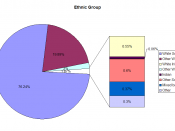Intercultural Adoption
Being a child in the world today can be confusing and complicated. Dealing with peer pressure, family pressures and growing pains may feel insurmountable to a child that's struggling to gain their identity. Learning who they are and where they fit within the context of a family is more complicated for children growing up in adoptive families than it is for children growing up in their genetic families. Intercultural adoption adds another layer of identity issues for the family as well as the child. Opponents of interracial adoption feel that it impacts on the child's ability to identify with its own race and culture. I believe in intercultural adoption, because every child deserves the stability of a warm and loving home. Anyone who chooses to adopt a child, especially outside of their race is to be commended for their willingness to provide a secure and loving home. The only restrictions I would put on the adoptive family is that they have no criminal record and no history of domestic violence or child abuse.
While those are the only restrictions I can think of, I do strongly feel there should be conditions placed on the adoptive families. The biggest condition is that the adoptive teaches and exposes them to their own culture as much as possible.
While it may be admirable to adopt a child outside of your own race, the hard work happens after the child is in the home. Filling the physical and emotional needs of a child who has lost their parents or may be the victim of abuse and neglect can be very difficult. Then to move a child from the culture they are used to and entrenching them in one that isn't familiar to them, pose another obstacle. According to Myron Lustig and Jolene Koester, author of Intercultural Competence: Interpersonal Communication Across Cultures, "Differences in the expectations of appropriate social roles of wife and husband, son and daughter, older and younger child, or husband's parents and wife's parents require a knowledge of and sensitivity to the varying influences of culture on family communications" (270). These roles differ from culture to culture. What the child is used to may be totally different from the way the roles play themselves out in the new family, therefore they have to learn what is expected of them and it is the parents duty to teach them.
Most intercultural adoptions, whether of children born in the United States or in other countries, follow the pattern of adults from the dominant cultural group adopting children who are members of cultural groups deemed to be of minority status in the United States. Individuals from a minority race also have to deal with how the larger society perceives them both as individuals and as members of a certain group. Lustig and Koester also points out that families differ in their influence over a person's social network and decision making (269). It is imperative that the adoptive family not only introduce the child to the culture they come from, but they have to allow the child to embrace that culture. An interculturally adopted child has the unique opportunity to take what they perceive to be the best of both cultures, and find their own identity. As a way of sensitizing a child and themselves to their child's heritage, the parents can bring culturally- suitable dolls, toys, books, art and music into to present positive images of their child's heritage. Parents may also seek out activities for their children outside of the home that have a high level of participation of children of a specific, or diverse, racial or ethnic group and similar social class. It is important for parents to help their children develop their cultural pride and self-esteem in a world that a lot of times does not appreciate or is cruel to individuals from different cultures. As adoptive parents in an intercultural family, you must reject any kind of racially or ethnically biased remark made in your presence. This includes remarks about your child's race or ethnic group, other races and ethnic groups. As a multicultural family, you should value all cultures. Explain to your child that every ethnic group has something meaningful to give, and that diversity is what this country is built on.
The more awareness that intercultural adoptive parents have, as well as a willingness to act on behalf of their child, the better equipped the child will be to live in a society where heritage still matters. Children, no matter their race or ethnic background are a gift from God. If adoptive parents are willing to love and care for a child of a different race or ethnic group and also help them to embrace both cultures, then I think the child will grow to be an open-minded and unique adult.


